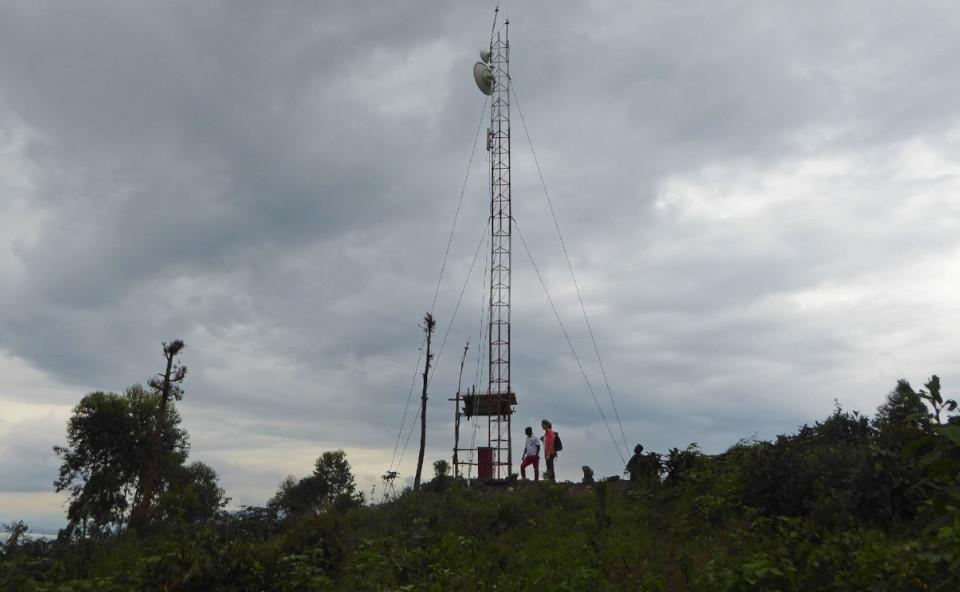
Photo of a Pamoja Net antenna in North Idjwi.
GenderIT and Locnet invited women who work in CNs to share their experiences in the times of COVID-19 and their reflections on what these times have revealed around centering meaningful communication in their physical and digital communities.
The Rusizi border between Bukavu and Rwanda
In the face of various security-related, climatic, economic and financial problems that affect Bukavu, a city in the east of the Democratic Republic of Congo (DRC), many women choose to try their luck in the neighbouring country, Rwanda, which appears to be more stable lately. They organise themselves to purchase goods on the other side of the border and resell them. This enables them a small-scale trade to sustain their families.
For the last six months, due to the pandemic, the two borders between the cities of Bukavu and Kamembe (in Rwanda) have been closed. All these women working in small-scale trade saw their only survival strategy dissolve with no explanation. Coronavirus became a nightmare.
When will the borders open again? What is the origin of the coronavirus? How can we fight it? These questions remain unanswered.
The role of Pamoja Net in this period
What is Pamoja Net?
Both in the province of South Kivu and the big city of Bukavu, internet access remains a luxury for the majority of the population, particularly in remote areas like Idjwi, an isolated island in Lake Kivu with more than 300,000 inhabitants. Many young locals have migrated to other places because of the lack of infrastructure and investment in the region.
The Mwami (king) of North Idjwi, one of Pamoja Net’s collaborators, recognised the value of connectivity for the island’s future economic development. With the attitude of a good father, he invited Ensemble Pour la Différence (Together For Diversity) to collaborate installing Pamoja Net, the first public Wi-Fi network, on the island.
Both in the province of South Kivu and the big city of Bukavu, internet access remains a luxury for the majority of the population, particularly in remote areas like Idjwi, an isolated island in Lake Kivu with more than 300,000 inhabitants.
The local community was involved in the design and installation of the network, which was launched in 2017. It is now used by more than 3,900 people and is financed up to 60% by local enterprises. It offers free public access to those living in the surroundings of the Pamoja Net kiosk installed in Bugarula. The network is also a platform for digital services co-designed with the local community. These services meet people's daily needs, ranging from education and health to savings and physical security.
The contribution of Pamoja Net in the fight against the coronavirus
After the arrival of COVID-19 in the DRC, the lack of information was evident: a significant part of the population doesn’t know who to believe due to misinformation and the negligence of authorities.
Facing such a discouraging situation, the average woman, who is already worried enough about her children, doesn’t pay too much attention to the coronavirus. For most people living in Bukavu, the least of their concerns is how to protect themselves against the virus. In part, this is due to unreliable information out there about this topic.
For most people living in Bukavu, the least of their concerns is how to protect themselves against the virus. In part, this is due to unreliable information out there about this topic.
In response to this situation, and the troubling observation that local inhabitants were being careless regarding the illness, Pamoja Net, in collaboration with Ensemble Pour la Différence, created a chatbot that provides health information for the community.
A small-scale awareness-raising campaign was organised in Bukavu where the Ensemble Pour la Différence offices are located. Despite not being able to reach out to the whole province as was originally planned due to limited resources, the chatbot helped raise awareness about coronavirus in the local community.
Through awareness-raising work groups organised by Pamoja Net, women and girls learned how to participate in the network and to access and verify health information through a telephone helpline and this chatbot. The chatbot shares basic information about COVID-19, its origins, preventive measures and how to respond in case of infection, as well as refuting related misinformation that can cause confusion amongst the population. A part-time team of technologists at Pamoja Net update the chatbot with data provided by the provincial health division and the national health institute dedicated to COVID-19.
The social repercussions of the coronavirus
While women struggle to feed their families, some of them are victims of domestic violence. Sexual and gender-based violence is a harsh reality in Bukavu. This critical period will not spare women in general, and particularly those struggling to make ends meet for their families.
While women struggle to feed their families, some of them are victims of domestic violence. Sexual and gender-based violence is a harsh reality in Bukavu.
In some households, these women have to witness their unemployed partners taking money from their savings to buy alcohol or drugs as a way of evading their feelings of worthlessness in the family. Many women have no possibility of demanding their rights with their husbands, who beat them if they dare to stand up to them. This type of conflict results, among other situations, in economic struggles and a negative impact on their children’s education.
Regarding education, Caddy Adzuba, president of the AFEM-SK (Association of Women in Media of South Kivu), reports an increase in teenage pregnancy in this period because schools are closed and parents are not able to monitor their children.
This grim picture leads us to believe that, because of coronavirus, nothing will be the same as before in the lives of these women who struggle day to day for survival.
Women and their families must tolerate the intolerable
In Bukavu, the coronavirus compelled families to accept that life won’t be as before, that the world economy is affected, that people can die because of the virus, and that life continues despite all of that.
In Bukavu, the coronavirus compelled families to accept that life won’t be as before, that the world economy is affected, that people can die because of the virus, and that life continues despite all of that.
Meanwhile, protection measures are still far from being respected. On the other hand, the government’s efforts to safeguard the population’s well-being and fulfil its basic needs are insufficient. Due to this situation, the city’s inhabitants, and especially women, are struggling to protect themselves and to meet their needs.
Though things have changed during the pandemic in Bukavu, many women still go out to different public markets to sell food, clothes, shoes and a range of different goods in order to make a minimum income and fulfill their role as parents. Sometimes without gloves, masks or disinfectants to protect themselves.
- 3863 views






Add new comment